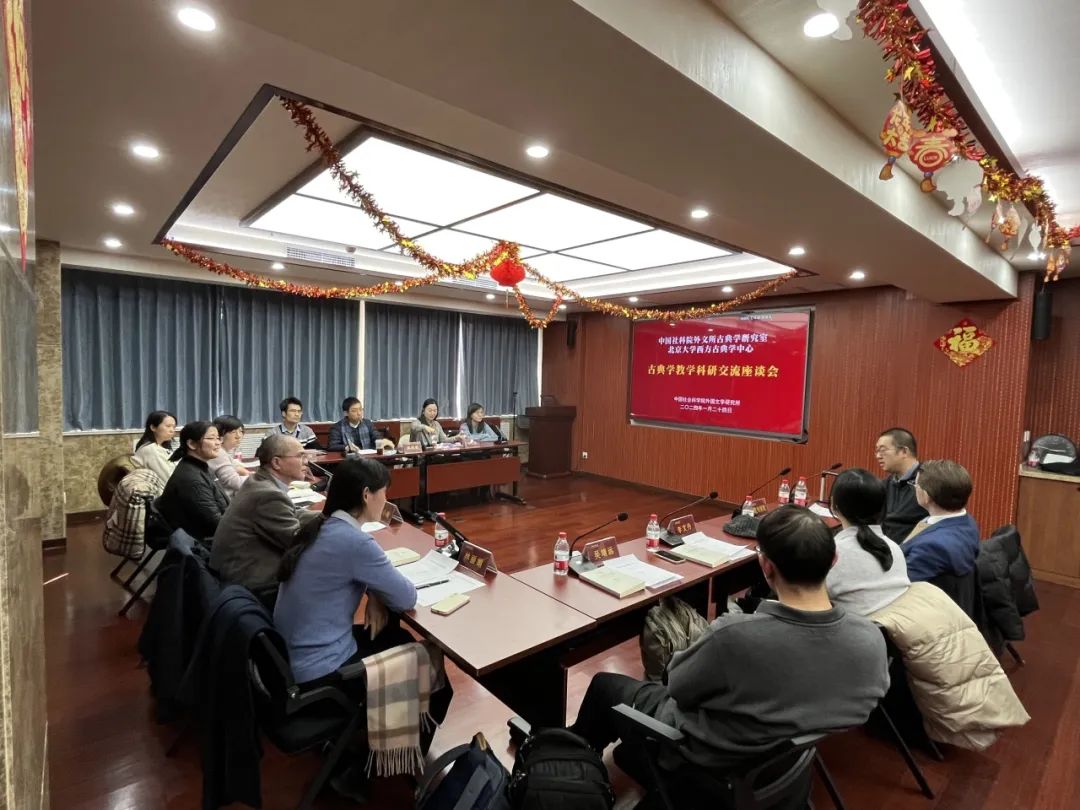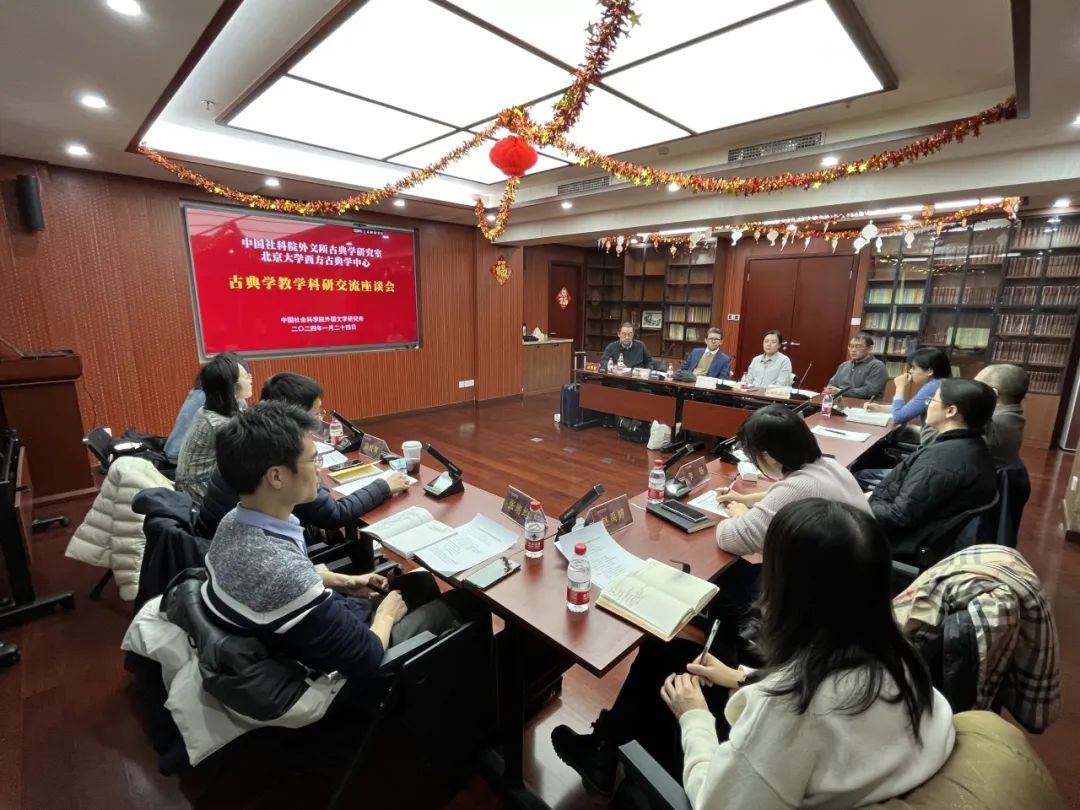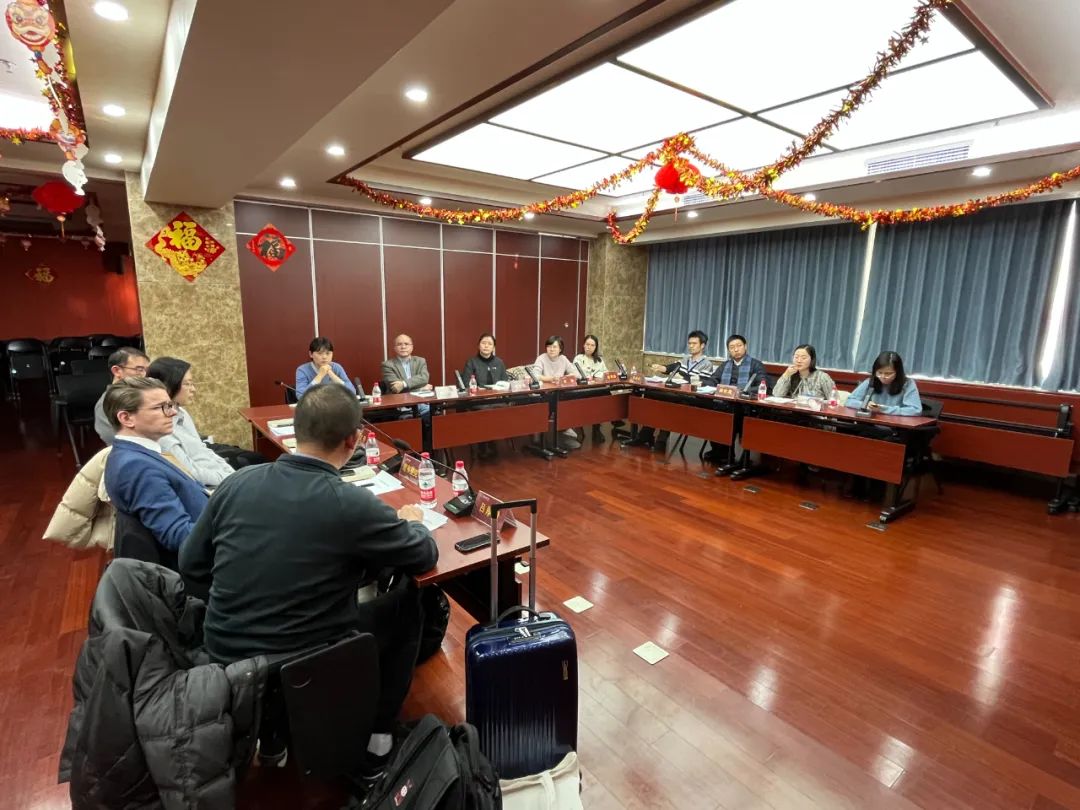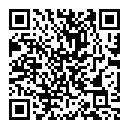

Trends
Collaborations
Meeting Minutes of the Symposium on the Exchange of Classics Teaching and Research
2024-02-19
Sourced from WeChat Official Account: Research in Classics
At 2 p.m. on January 24, 2024, a delegation of five scholars from Center for Classical and Medieval Studies (CCMS) at Peking University visited the Institute of Foreign Literature of the Chinese Academy of Social Sciences. Led by Professor Peng Xiaoyu, the delegation included Associate Professors Hendrikus Antonius van Wijlick and Lin Lijuan, and Assistant Professors Wu Jingyuan and Li Wendan. Focusing on the teaching and research of classics, the delegation engaged in a productive exchange with the Research Group of Classics of the Institute of Foreign Literature.
On behalf of the Research Group of Classics, Researcher He Fangying warmly welcomed the visiting Peking University delegation. Assistant Researchers Zhang Peijun and Gu Zhiying, along with Postdoctoral Fellow Li He, also participated in the meeting.
Associate Researcher Lv Houliang from the Institute of World History, Associate Researcher Li Junyang from the Institute of World Economics and Politics, along with Director Li Yang and Project Officer Zhao Yuting from the European Division of the Bureau of International Cooperation (BIC), CASS, attended the meeting as special guests.

During the symposium, the two teams engaged in a thorough discussion about the teaching, research, and future trajectories of Western Classics in China. Participants engaged in lively discussions on a range of critical issues, including challenges in teaching classical languages, approaches to nurturing talents in classical studies in China, the translation of Western ancient classics, building a collaborative academic community for classical studies in China, and strategies for advancing this discipline.
Drawing on the current state of teaching Western classical language in China, Professor Peng Xiaoyu pointed out that while providing university students with extensive language training and a diverse range of specialized courses is crucial, it is equally important to consider the research responsibilities of educators, emphasizing the necessity to expand the teaching and research teams. Hendrikus Antonius van Wijlick, Li Wendan, Wu Jingyuan, and Lin Lijuan,
all classical language professors at Peking University, shared insights from their respective teaching experiences and research directions. They emphasized the need for greater professional exchange within the field, proposing more specialized lectures and reading clubs, more resources available for classical studies, and a stronger connection between language study and students' future academic and career paths. Professor Lv Houliang shared his perspectives based on his experience teaching Ancient Greek at the University of the Chinese Academy of Social Sciences (UCASS). Professor Li Junyang drew on her years of auditing courses at Center for Classical and Medieval Studies at Peking University. They discussed issues related to the current course hours, teaching materials, teaching methods, and strategies for sustaining student interest in classical language studies.
Drawing from her experience teaching graduate courses in Ancient Greek and Classical Latin in recent years at the Institute of Foreign Literature, Professor He Fangying suggested that, given the limited course hours available, the teaching of classical languages should be combined with the study of original historical and literary texts in order to enhance the overall classical literacy of graduate students. Assistant researcher Zhang Peijun, drawing on his personal learning experiences, emphasized that studying classical languages requires students to dedicate sufficient time and enthusiasm and that it is a mutual learning process for both students and teachers. Additionally, participants engaged in a lively discussion on teaching objectives and assessment criteria for classical languages, as well as the potential integration of classical language teaching with standardized certification for classical language proficiency.

Another important topic of the symposium was the translation and teaching of foundational classics. Assistant researcher Gu Zhiying highlighted several challenges currently facing the research and teaching of classical studies in China. First, there is insufficient emphasis on annotated translations. Second, the quality of Chinese translations of classics still needs improvement. Third, classical language teaching should focus more on training students to translate Latin and Ancient Greek texts into Chinese. Professors Lin Lijuan and Wu Jingyuan acknowledged the significance of these issues, noting that there is still a long way to go in the translation of ancient Greek and Roman classics in China, and the Graeco-Arabic translation movement in Baghdad during the 8th to 10th centuries may serve as a valuable reference for us.
Finally, Professors Peng Xiaoyu and He Fangying proposed ideas and suggestions regarding standardized examinations for Western classical languages, collaborative initiatives like the "Four Universities Alliance", sharing of teaching and research resources among universities, and credit transfer among institutions. Director Li Yang expressed the International Cooperation Bureau's strong support for the development of classical studies and its international exchanges at CASS. He sincerely sought feedback from the attending faculty on the practical challenges and potential needs in international collaboration.
The symposium marked the first formal and in-depth exchange between the Research Group of Classics of the Institute of Foreign Literature of CASS and the Center for Classical and Medieval Studies at Peking University. The participating scholars, drawing from their expertise in classical studies and extensive experience in teaching classical languages, actively contributed ideas and suggestions for advancing the teaching and research of Western classical studies in China. Both sides expressed their eagerness for further exchanges and shared their commitment to building a collaborative academic community for classical studies in China.





